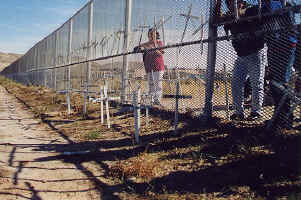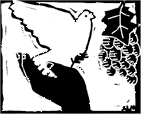|
US / Mexico Border: The church reminds us of a higher law (December 2000)by West Cosgrove
On November 2, El Día de los Muertos, hundreds of people, gathered to pray at the site of the border fence between Sunland Park, New Mexico and Puerto de Anapra, Mexico. We were between 300-400 people, on both sides of the border, gathered to celebrate our common faith. We gathered to say that walls cannot divide the People of God. We gathered to pray for those who have died trying to cross the border. (According to a study by the University of Houston, over 300 people died last year, mostly in the desert.) We were one of many groups gathered along the 2,000 mile border that the United States shares with Mexico, to pray for a more just immigration policy. The Clinton administration began a new strategy in 1994, strangely enough corresponding with the initiation of NAFTA, which supposedly sought to remove barriers between the United States, Mexico and Canada. "Operation Hold the Line" in El Paso and "Operation Gatekeeper" in the San Diego area seek to effectively block any possibility of immigrants crossing into the United States in the urban areas, instead being forced into the deserts and mountains, where the conditions are much harsher and can be dangerous. Six years later, it is clear that the policy has done little other than give the appearance of boundary control, and to cause large numbers of migrant deaths. The bishop of Ciudad Juárez, Chihuahua, Mexico, Renato Ascencio Leon, joined us for our celebration. The bishop and many clergy gathered around one altar, divided by the fence. On each side of the fence we also set up the traditional Altar de los Muertos, filled with food and drink. Images of Nuestra Señora de Guadalupe were prominent on both sides of the border. During the Mass, we exchanged the flags of Mexico and of the United States, symbolizing further that what unites us is stronger than what divides us.
Perhaps the most striking image present were the hundreds of crosses, on both sides of the border, representing those who have died trying to cross into the United States. Admittedly the role of the Border Patrol is to enforce the immigration laws of the United States. It is the role of the Church to remind us of a higher law. Judeo-Christian tradition is strong and clear regarding our duty to welcome the alien and the immigrant. The Hebrew and Christian Scriptures over and over again remind us that we must "befriend the alien." Catholic Church teaching tells us that, "Every human being must have the right of freedom of movement and of residence within the confines of their country, and, when there are just reasons for it, the right to emigrate to other countries and take up residence there" (Pacem en Terris). International law also allows for this type of freedom of movement. We know that if those who seek to enter the country illegally could do so legally, they would. They enter by the only means available to them. They are driven by poverty and hunger and they will certainly continue to come. Our message was not that the United States should not enforce its laws. Our message is that laws must be just and must serve the common good. We also sought to convey the message that it is important that immigration laws take into consideration the root causes that have created the present conditions. If we are to benefit by a global economic system, we must also live up to our responsibilities. We must more and more live out the truth that we are all brothers and sisters in one human family. We are all children of God and national borders cannot be an excuse to allow part of the family to live in an undignified and unjust manner. We believe that the vast majority of the people who attempt to cross the border without the required papers are good people. They are not criminals. They come for simple reasons: not enough food, no work, or a threatening political situation. These are the same reasons that brought our parents and grandparents to this land. Research at the University of California indicates that overall these new policies are having little effect in stemming unsanctioned immigration. And one unintended consequence seems to be that the immigrants are less likely to migrate back to Mexico in the off-season. The issues that shape this debate are quite complex. As such there are no easy answers. But this is exactly the reason that we need to continue the debate, inviting the participation of many sectors of both countries. From our faith perspective, we believe that immigrants today are the same as our ancestors, the same as you and I, only arriving a few years too late for compassion. West is director of the Maryknoll Border Mission Program in El Paso, Texas
3053 Fourth Street NE w Washington DC 20017 w 202-529-0441 |



